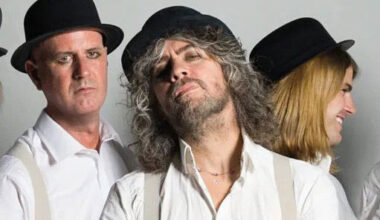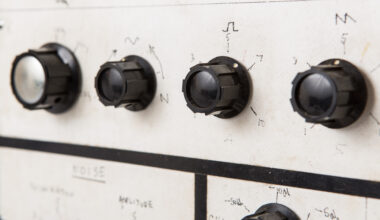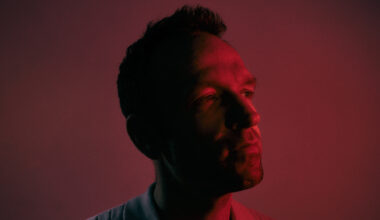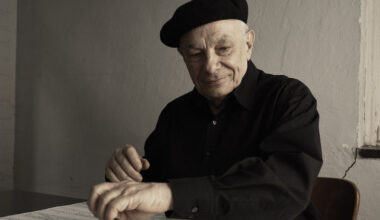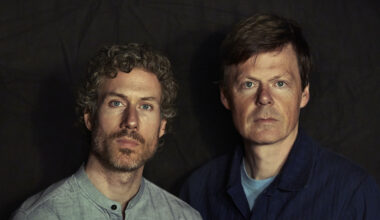Gwenno hasn’t simply crafted a fantastic electro-pop album, one of the best you’ll hear all year. She’s crafted a fantastic electro-pop album on which every track is sung in Welsh (apart from the one that’s in Cornish)
“We’d just moved back to Wales and had this epiphany of wanting to make an exciting Welsh language pop record,” says Gwenno Saunders, describing the moment that it dawned on her and her producer husband Rhys Edwards that they should make an electro-pop album sung entirely in the Welsh language. “It really was that simple.”
Wales has produced a lot of notable rock music since the 1990s explosion of Manic Street Preachers, Catatonia and Welsh language proselytisers Super Furry Animals and Gorky’s Zygotic Mynci. But what about pop? And electronic pop at that, supremely melodic with an avant-garde, experimental taint?
I must admit that the last place I’d expect this sort of stuff to surface was Wales. But Gwenno is here to put me right. Apparently there’s a profusion of great electro-pop coming out of Wales, much of which she plays on her weekly Radio Cardiff show, ‘Cam O’r Tywyllwch’ (’A Step Away From The Darkness’).
Gwenno’s debut album, ‘Y Dydd Olaf’ (‘The Last Day’), sits at the pinnacle of this new movement. It’s a strikingly sonorous record gilded with her breathy, textured voice – think frosted glass – and the tantalising curlicued vowels and seemingly obdurate consonants of the gloriously idiosyncratic Welsh language. Listening to it, I’m almost positing her as the Welsh equivalent of a chic French chanteuse, the grain of her voice (as Roland Barthes would have had it) as cool and aerated as the soothing chic of Francoise Hardy, Brigitte Bardot or Charlotte Gainsbourg.
The sound of these delicious linguistic ululations floats over a backdrop that is pure retro futurism – bright and gleaming and optimistic, yet with the fizz and crackle of analogue synths. It’s no surprise that the album’s influences include krautrock and Kraftwerk, Broadcast, Joe Meek’s ‘I Hear A New World’ album, and the early electronic pioneers Daphne Oram and Delia Derbyshire. There are also hints of library music, public information films of the 60s and 70s, and Ghost Box Records, the cult imprint whose co-founder Jim Jupp “is from Newport, South Wales”, as Gwenno informs me.
So how did she and Rhys create this pristine electronic sound with something of a sepia tint to it? Banks of old and rare keyboards in the studio?
“We were trying to make this record with the little we had,” explains Gwenno with a sigh. “We’ve got a home studio, which is fantastic, but we don’t have any old synths, so we spent hours and hours on the computer, treating the samples we had and turning them into something else. I can laugh about it now, but we had this broken laptop, and the screen would flick on and off all the time. You couldn’t play a track all the way through. It was infuriating. A lot of it was just down to patience. We were sat there for hours and hours.”
She perks up as we begin talking about other Welsh language artists. Malcolm Neon, a one-man post-punk electronic project from Cardigan, is one of her more recent discoveries. In the 1980s, he put out tracks on his own Casetiau Neon label and later also on Fflach, the respected Welsh new wave imprint. Most of his music was only ever available on cassette.
“He looked like David Bowie and sounded like early Human League,” says Gwenno. “I’ve actually covered one of his tracks and we’re going to put it on the bonus vinyl version of the album. It’s called ‘Nefoedd’, which means ‘Heavenly’, and that’s interesting because I am with Heavenly Records. I have to say I was quite excited about covering a Malcolm Neon track.”
The other Welsh electronic outfit she enthuses about, Llwybr Llaethog, also started out in the 80s. Hailing from Blaenau Festiniog in the mists of Snowdonia, they’re still around today, mixing electronica, dub, punk and hip hop with left-wing political rhetoric. The late John Peel was a big fan.
“They’ve been making futuristic dub sounds for 30 years and they do a lot of experimenting as well,” says Gwenno. “They met at school in Blaenau, then they moved to London together. When I was growing up, they were one of the bands that made me prick my ears up. They sounded inner city, which is not what you expect from a Welsh language band. They were certainly unique in that sense.”
Equally unique is the concept of Gwenno’s coruscating debut album. The record is based around the 1976 dystopian sci-fi novel ‘Y Dydd Olaf’ by Welsh language author and poet Owain Owain, which tells the story of a bleak future where robots have taken over the world and are turning all the humans into clones by forcing them to take medication. Gwenno discovered the novel through reading the now defunct Babylon Wales blog.
“I think it was part of the Ghost Box blogging scene,” she says. “They were these blogs all about rediscovering old things, things that had been forgotten in culture, and this particular one was focused on Wales.”
When Babylon Wales blogger Anthony Brockway uploaded the book cover of ‘Y Dydd Olaf’, it struck a chord with Gwenno and she went to find it in her local library.
“I’d been thinking a lot about dystopian futures and getting into that kind of fiction for quite a while,” she notes. “I’d been reading the standard stuff like Huxley’s ‘Brave New World’ and Owain Owain was inspired by those kinds of books as well. When I read ‘Y Dydd Olaf’, I was like, ‘Oh, this was exactly what I was looking for’.”
But Owain Owain wasn’t just known for his pioneering use of the Welsh language in novels. It seems he was ahead of his time in another way too.
“He actually predicted the internet revolution,” reveals Gwenno. “He wrote a piece for a weekly Welsh newspaper called Y Cymro [The Welshman] in which he said that schools in the future would get all their information from a computer and would then discuss the ideas they found.”

The opening track of Gwenno’s album, ‘Chwyldro’ (‘Revolution’) is a celebration of radical and dramatic changes – from the industrial revolution to the French Revolution to the recent Welsh language revolution. She talks about Saunders Lewis and his famous 1962 radio lecture, ‘Tynged Yr Iaith’ (‘Fate Of The Language’), which was part of the BBC’s regional output and referred to the crisis in the Welsh language at the time. “It is only through revolutionary methods that you can succeed,” declared Lewis and this was the spark for the Welsh language movement that is the basis for today’s Welsh language pop culture.
“Revolution is a loaded word, isn’t it?” offers Gwenno. “A lot of the thinking for ‘Chwyldro’ came about from walking around Cardiff. The city has lots of buildings that are getting knocked down. The council and the developers have been obsessed with creating new office blocks, but they’re all generally quite empty because nobody wants to be in them. At the same time, I was also thinking about how so much of our lives are on computer now, so it’s also about the technological revolution.”
The result is a compelling call to arms. And with a track like that opening her album, I can’t help but wonder if she’s a bit of a leftie.
“Oh God, yes!” she answers forcefully. “With the parents I have, there’s not a chance I’d be otherwise. There has always been a very strong tradition of left wing politics in South Wales – well, throughout Wales really, but particularly in the industrial areas of the country. When you come from a less economically advantaged place, I think you’re more aware of injustices and the need for changes.”
She’s on a roll now, so we talk about ‘Patriarchaeth’ (Patriarchy), a track that has Gwenno expounding feminist ideology. “Patriarchaeth a dy enaid di tan warchae,” she sings (“Patriarchy and your soul is under siege”). I tell her I’m impressed that there is a word for patriarchy in Welsh, indicating that the language is adapting to the politics of modern times.
“You know, I think I’ve become more conscious of sexism the older I’ve gotten,” notes Gwenno. “But I also think the internet really highlights a lot of the ways that society is patriarchal.”
With that, our conversation turns to whether Wales has a particular problem with reactionary gender roles. I ask her if this might be down to conservative working class culture in the south and the historic influence of the chapel.
“Yeah, there are a lot of traditionalists,” she says. “But then if you think about the miners’ strike, for example, that was a time when the women took charge of running things in the community. And actually, I do think it’s a global issue. Look at the reaction to someone like Charlotte Church just opening her mouth and having a really valid opinion. The knock-downs you get if you’re female is horrendous.”
Like Charlotte Church, Gwenno grew up in Cardiff in the 1980s (she is 34 years old). Her parents are now both translators, but when she was a child her father worked for the BBC and her mother was a college lecturer.
“I grew up in Riverside, which was predominantly a Somali and Bangladeshi area, so everyone was different to us and that was great,” she says. “We lived in a flat with lots of books around, but it was also quite dark. I remember Cardiff at that time being very, very grey and very, very empty. People were leaving Cardiff until the early 90s.”
Get the print magazine bundled with limited edition, exclusive vinyl releases

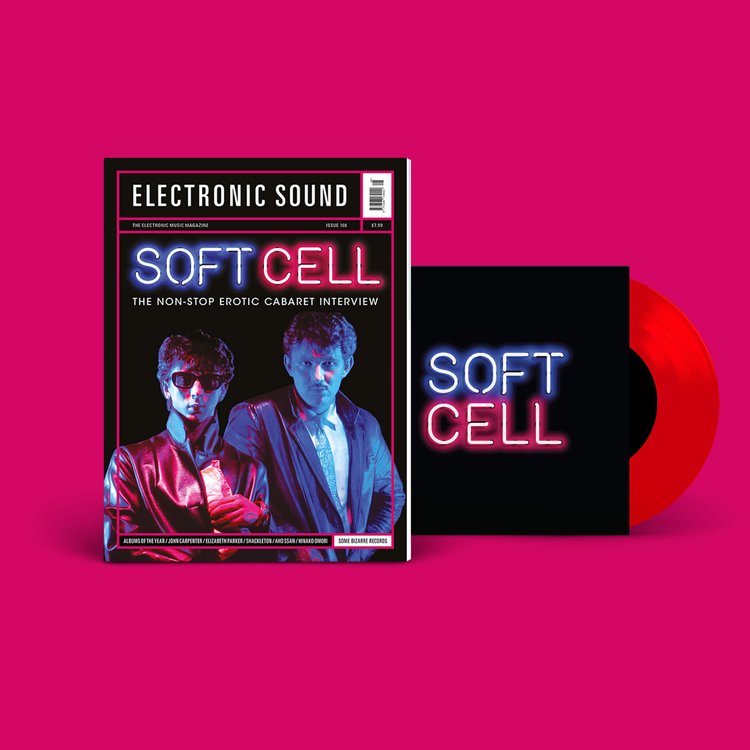
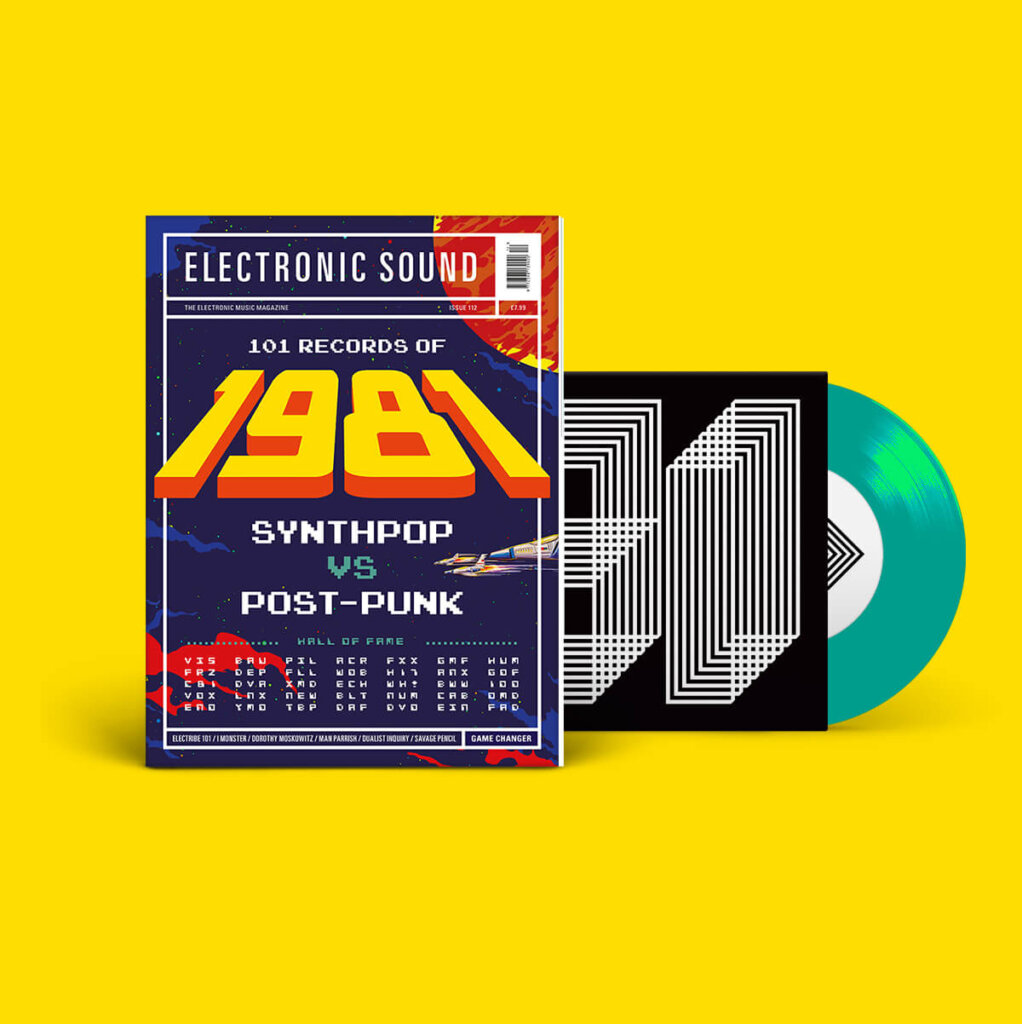
As a child, her mother spoke Welsh but father spoke Cornish, so Gwenno is trilingual. In fact, the last song on ‘Y Dydd Olaf’, ‘Amser’, is sung in Cornish. The word means time and I note that it is the same word in Welsh.
“There are huge similarities between Welsh and Cornish,” explains Gwenno. “Welsh and Cornish are from the same group of languages, they’re both Celtic, and so is Breton as well. So because I can speak Cornish, I can read Breton road signs.”
There’s just enough time to speak about Gwenno’s love of pop music. She is a former member of The Pipettes, an indie pop band based in Brighton who were signed to a major label. But listening to The Pipettes’ music, I don’t think the group’s melodies were as strong as those on ‘Y Dydd Olaf’.
“We were always a bit at odds with being on a major,” says Gwenno. “But, you know, we were never going to be Katy Perry. And I had all these alternative ideas anyway.”
So what does she think of the current commercial pop scene, as epitomised by the Radio 1 playlist?
“I actually quite enjoy listening to Radio 1,” she laughs. “I think there’s a real dystopian feel to it. The songs that get played on Radio 1 are all about love, ‘I want you’ and ‘I need you’ and all this, but they sound like robots. If you created a robot and you wanted it to be emotional, that’s what it would be like. There’s an emptiness to the music. In the ‘Y Dydd Olaf’ book, everyone goes to a place called the House of the Sunset, which is where they get cloned, and I imagine if you were allowed to have a disco before that happened, this would be the music you’d hear.”
With that in mind, does Radio 1 even matter any more? After all, they’re almost certainly never going to play the kind of brave and brilliant leftfield pop music you will find on Gwenno’s ‘Y Dydd Olaf’ album.
“Things are so scattered now that I think you can ignore the charts, even if you’re an 11-year-old,” she says. “It’s just not so important in our lives any more. It doesn’t represent the mass of people like it once did.”
Instead, there are new discoveries to be made, like Gwenno’s fabulously vivid retro futuristic pop tones. Diolch yn fawr – thanks be – for that.
‘Y Dydd Olaf’ is out on Heavenly

